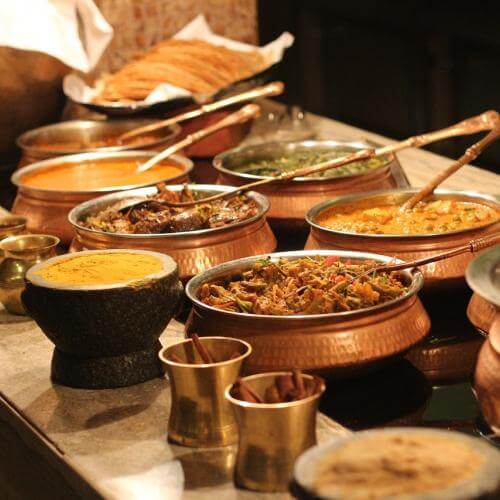
Appropriate diet (ahara) and lifestyle (vihara) are integral parts of Ayurvedic therapy to correct the disturbed psychosomatic balance of the body and are necessary to maintain our individual constitutional balance of the three doshas that ensures our health.
Ayurvedic diet
Ayurvedic diet therapy (ahara) is the conscious preparation and consumption of appropriately chosen foods that are in harmony with our doshic constitution. Such food then becomes our medicine, which profoundly affects the state of our physical, mental, emotional and spiritual health. It is therefore very useful to follow the action of the six tastes (sweet, sour, salty, hot, bitter and astringent) and to respect a few practical principles:

- don't overeat
- not to drink fruit juices during meals
- not to drink chilled water
- not to eat before 7 a.m. and after 7 p.m.
- be aware of appropriate food combinations
- eat in a quiet and pleasant environment
Recommendations for the diet of persons with a predominance of vata dosha
Recommendations for the diet of persons with a predominance of pitta dosha
Recommendations for the diet of persons with a predominance of kapha dosha
Not sure what your predominant doshic constitution is? Take the online doshic test!
Basic types of diet according to Ayurveda
Ayurveda divides food into Sattvic, Rajasic and Tamasic according to its effect on the human psyche. Each food is characterized by one of these three cosmic qualities (gunas).
- Sattva is the quality of light, knowledge and harmony.
- Rajas represents energy, movement and constant activity.
- Tamas represents darkness, inactivity and sleep.

People who mostly eat naturally sweet sattvic food such as rice, barley, sweet potatoes, red or yellow lentils, vegetables, fruits, nuts, milk, cheese, cane syrup and honey are kind, calm, optimistic and full of vigour. People who have a predominantly Rajasic diet of fermented and fried foods along with spicy, salty and acidic ingredients such as curry, chilli, beans, salt, pepper, pickled vegetables, vinegar, sour cream, coffee, coca-cola and black or green tea are prone to irritability, nervousness and impatience. People who favour a tamasic diet with a preponderance of bitter and astringent tastes such as meat, fish, mushrooms, eggs, onions, garlic, alcohol or leftovers from yesterday's meal, and who seek out sweets made from refined sugar, dairy products, yoghurt and ice cream, are prone to fatigue, despondency and pessimistic moods.
It is advisable to adjust the diet appropriately to the changes in the seasons. In autumn and winter (vata dosha season), one should prefer warm food and drink and a more filling and fatty diet. It is good to eat more sweet, sour and salty foods and less bitter and astringent foods. Avoid dry and raw foods. In the hot summer season (pitta dosha season), the power of digestion decreases and therefore we are less hungry or have no appetite. It is good to choose cold foods, fruits and vegetable salads. It is good to give preference to sweet, bitter and astringent tastes and avoid sour and spicy foods. In spring (kapha season), prefer a light and dry diet. Choose warm foods and hot drinks. It is good to eat spicy foods and prefer bitter and astringent tastes to sour and salty ones. This aids the important spring detoxification process. It is recommended to limit sweets.
Ayurvedic lifestyle
Healthy lifestyle therapy (vihara) is the most natural means and the so-called "middle way" to achieve physical and mental balance. It does not mean suppressing one's needs, but learning to control them and to live in accordance with one's constitutional nature and the inner guidance of one's soul (atman), which is the very essence of life and the true source of our capacity for healing.
So if we can incorporate the practice of yoga and meditation into our daily routine, then it will help us to perceive the inner guidance of our soul. A regular meditation practice can include body postures (asanas), breathing exercises, mantra repetition or visualizations designed to calm and quiet our minds so that we can feel peace, love and compassion in our heart center in the center of our chest (anahata chakra). Without meditation or other spiritual ritual according to traditional religious or cultural practices, our lives have no real background of inner security, stability, confidence and balance.
"Smaller than the smallest, greater than the greatest, the soul breathes in the hidden heart of man." - Kathopanishad
Ayurvedic medicine appeals primarily to conscious prevention and a healthy lifestyle, because the origin of most diseases is seventy percent hidden in improper lifestyle, which causes disorders of individual doshas. Disturbances in the constitutional balance are always easier to treat in their early stages than in their advanced stages, when they begin to manifest themselves in the form of various diseases. Therefore, the success of Ayurvedic therapy depends mainly on eating the right diet and also on our willingness to change some of the existing habits and stereotypes in our daily life, which are often at the root of our health problems.
 The current modern lifestyle contributes significantly to the disturbance of our doshic balance, as we are constantly exposed to situations that provoke feelings of worry, fear, insecurity or aggression. Improper diet or inappropriate combinations of foods, consumption of meaty or fried foods, fats and carbohydrates, alcohol, coffee or the use of tobacco products and chemical drugs disturb the balance of all three doshas. A preference for high speeds in driving or sports and constant travel by car or plane causes nervous agitation that increases the vata dosha.
The current modern lifestyle contributes significantly to the disturbance of our doshic balance, as we are constantly exposed to situations that provoke feelings of worry, fear, insecurity or aggression. Improper diet or inappropriate combinations of foods, consumption of meaty or fried foods, fats and carbohydrates, alcohol, coffee or the use of tobacco products and chemical drugs disturb the balance of all three doshas. A preference for high speeds in driving or sports and constant travel by car or plane causes nervous agitation that increases the vata dosha.
 The excessive use of social media, watching news, information and advertisements on the internet or in the mass media, by its coercive nature and subliminal form of persuasion, affects the free will of the individual and his thinking and decision-making. The dissemination of predominantly negative and one-sided messages in the media and the direct transmission of conflict and violence increases vata and pitta dosha and stimulates instinctive emotions of hostility, insecurity and fear. The emphasis on material values of money, possessions, success and power overrides the natural need to actively develop the spiritual aspects of life.
The excessive use of social media, watching news, information and advertisements on the internet or in the mass media, by its coercive nature and subliminal form of persuasion, affects the free will of the individual and his thinking and decision-making. The dissemination of predominantly negative and one-sided messages in the media and the direct transmission of conflict and violence increases vata and pitta dosha and stimulates instinctive emotions of hostility, insecurity and fear. The emphasis on material values of money, possessions, success and power overrides the natural need to actively develop the spiritual aspects of life.
 The daily life of our civilization is driven only by conventional economic tools, which include the creation of scarcity, demand and stimulation, the enhancement of work efficiency, profit and reward, and the production of entertainment for moments of leisure, comfort and relaxation. This is why we often experience feelings of over-saturation, mental restlessness, mental emptiness, frustration and dissatisfaction. Therefore, we need to return to the roots of the spiritual nature of life and take basic corrective measures in the form of adjusting priorities and proper daily routine (dinacarya) to bring life into a natural balance in the form of physical and mental health.
The daily life of our civilization is driven only by conventional economic tools, which include the creation of scarcity, demand and stimulation, the enhancement of work efficiency, profit and reward, and the production of entertainment for moments of leisure, comfort and relaxation. This is why we often experience feelings of over-saturation, mental restlessness, mental emptiness, frustration and dissatisfaction. Therefore, we need to return to the roots of the spiritual nature of life and take basic corrective measures in the form of adjusting priorities and proper daily routine (dinacarya) to bring life into a natural balance in the form of physical and mental health.
